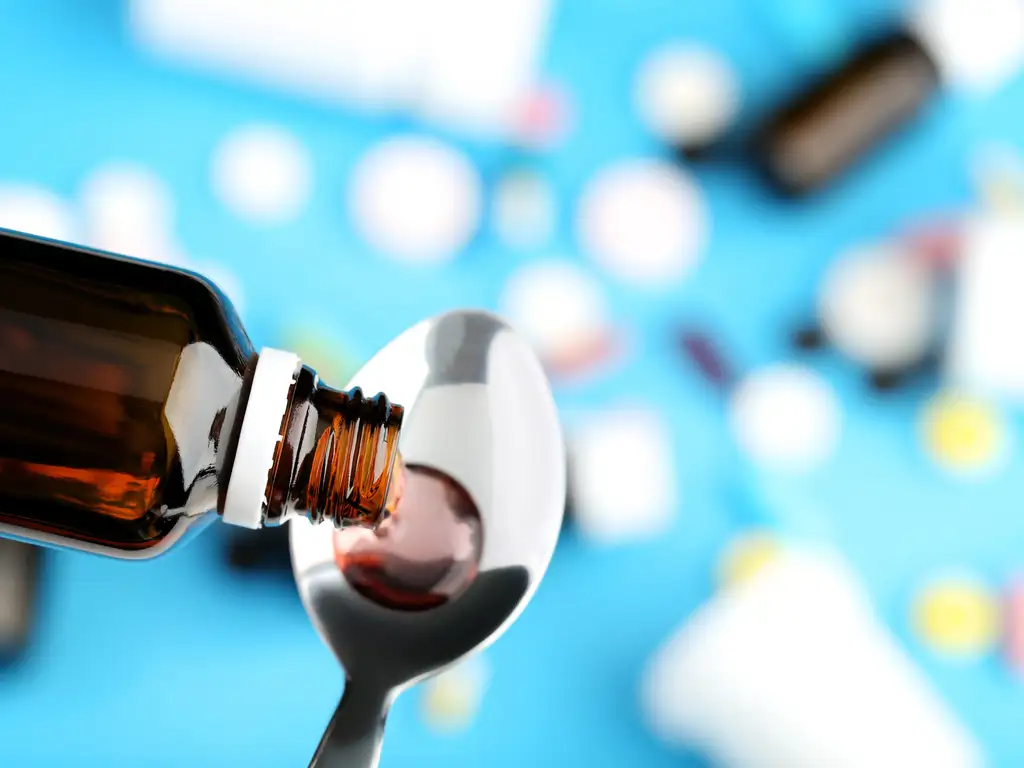
Origins of Lean: Cough Syrup Becomes A Recreational Drug
Lean, also known as “purple drank” or “sizzurp” is a recreational drug concoction made with cough syrup that has gained popularity, especially with young adults.
The lean drink is a dangerous cocktail made by combining one or more prescription cough medicines typically containing codeine and/or promethazine. These products are prescribed for serious respiratory conditions and are not available over the counter.
The prescription syrup is typically combined with soda (often Sprite) and sometimes hard candy like Jolly Ranchers for added flavor. The color of the resulting beverage has earned the “purple drank” moniker.
Cough syrup abuse and lean drinking has garnered attention in recent years due to its association with prominent figures in the music industry and the concerning rise in drug abuse among young people.
This article aims to answer the question “what is lean?” as well as what the long term effects of lean dependence are, and what the options are for people seeking lean addiction treatment for this rising form of substance abuse.
Is Purple Drank The Same As Lean?
There are many different terms used to refer to lean. “Purple drank” is one of the more popular euphemisms, but people may also refer to it as “Dirty Sprite,” “oil,” “mud,” or by popular brand names, including Wockhardt, Tris, and Actavis.
What Does Lean Consist Of?
The composition of “purple drank” varies depending on the area and user, but almost always includes a controlled substance that is extremely harmful in high doses.
These are just a few of the most typical ingredients employed by people who abuse lean:
Codeine
Codeine syrup is an opiate painkiller that is commonly prescribed to relieve mild to moderate pain and suppress coughing and muscle aches. As an opiate, it belongs to the same class of drugs as heroin and morphine, and has similar euphoric effects.
Codeine acts on the central nervous system, binding to opioid receptors and inducing a sense of euphoria and relaxation. Its intended effect is to reduce pain in the respiratory system, but at high doses, it can actually induce respiratory depression.
Promethazine
Promethazine is an antihistamine and sedative often prescribed to treat allergies, motion sickness, and nausea. When combined with codeine, promethazine enhances the effects of the opioid and increases respiratory depression, which can lead to dangerous consequences. Although most lean-related drug abuse includes opiates, some users will drink lean with “plain” syrup, which includes promethazine but not codeine and is easier to obtain.
Hydrocodone
Some forms of lean include other cough syrups that contain hydrocodone, another opiate. This form of syrup is often yellow rather than purple, meaning it will not resemble the typical “purple drank.” Still, people who abuse the lean drug in this form will need a medical detox and experience many of the same dangerous effects as those who drink codeine cough syrup.
Soda and Candy
The codeine-promethazine (or hydrocodone) cough medication is typically mixed with soft drinks to improve the lean taste, as cough syrups are notoriously unpleasant to consume. Additionally, some users add hard candy, such as Jolly Ranchers, to further enhance the flavor.
What Are the Side Effects of Lean Abuse?
The health risks of lean abuse are not as widely known as other drugs. Yet addiction to lean is one of the more serious substance use disorders.
The physical dependence produced by using lean can produce severe withdrawal symptoms when a user tries to stop. Lean addiction can lead to many of the same withdrawal symptoms as other opiate substance abuse.
These are some of the side effects that may result from drinking lean.
How Does Drinking Lean Affects The Body?
The physiological effects of lean range from slowed heart rate and breathing to gastrointestinal problems and several others including physical dependence.
Let’s examine how lean affects the body:
Slowed Heart Rate And Breathing
Codeine is a central nervous system depressant, and high doses can slow down the user’s heart rate, particularly when combined with other drugs. Additionally, lean slows a person’s breathing, leading to respiratory depression. This can be life-threatening and increase the risk of respiratory failure, especially during a codeine overdose.
Gastrointestinal Problems
Codeine abuse can cause severe constipation, which can become chronic and difficult to manage. Long-term constipation may result in hemorrhoids, anal fissures, or bowel obstruction.
Nausea and Vomiting
Codeine use may cause gastrointestinal disturbances, leading to persistent nausea and vomiting. People who try to stop lean abuse may also experience withdrawal symptoms that include vomiting and stomach pain.
Weakened Immune System
Chronic codeine abuse can weaken the immune system, making individuals more susceptible to infections and illnesses.
Liver and Kidney Damage
Some codeine formulations contain acetaminophen, which, when taken in excessive amounts, can cause severe liver damage and other negative consequences. Long-term codeine use can also negatively impact kidney function.
Hormonal Imbalance
Consuming lean can disrupt the endocrine system, leading to hormonal imbalances, which may manifest in menstrual irregularities (in women) and reduced testosterone levels (in men).
Sexual Dysfunction
Codeine addiction can cause sexual dysfunction, including decreased libido and difficulty achieving or maintaining an erection, as well as urinary tract infections.
Physical Dependence
One of the most significant side effects of codeine addiction is physical dependence, where the body becomes reliant on the drug to function normally. Abruptly stopping codeine use can lead to withdrawal symptoms.
Does Lean Affect Your Mental Health?
The psychological effects of lean are just as devastating as the physiological.
Let’s examine how lean affects one’s mental and emotional heath:
Mood Swings
Lean addiction can lead to unpredictable mood swings, with individuals experiencing periods of euphoria followed by depressive or irritable episodes.
Anxiety and Panic Attacks
Chronic codeine abuse can exacerbate feelings of anxiety and lead to panic attacks.
Cognitive Impairment
Prolonged codeine use can impair cognitive function, memory, and concentration, affecting an individual’s ability to perform daily tasks effectively.
Impaired Judgment
Lean addiction can impair decision-making skills and lead to risky behaviors.
Emotional Numbness
Codeine can dull emotional responses, leading to emotional numbness and an inability to experience pleasure without the drug.
Social Isolation
Individuals struggling with lean addiction may withdraw from friends, family, and social activities, preferring to spend time alone or with other drug users.
Psychological Dependence
Lean addiction is not only physically addictive but also psychologically addictive, leading individuals to crave the drug and prioritize its use over other aspects of their lives.
How Drinking Lean Affects Your Life: Social and Behavioral Side Effects Of Lean
Relationship Strain
Lean addiction can strain relationships with family, friends, and partners due to changes in behavior and priorities.
Occupational and Academic Impairment
Addiction to cough syrup can lead to a decline in work or academic performance and increased absenteeism.
Financial Problems
Sustaining a codeine addiction can be expensive, leading to financial strain and potential legal issues related to drug-seeking behavior.
What Does A Lean Addiction Look Like?
All of the above symptoms can be clues that someone is drinking lean and may need professional help. If you consistently notice missing drugs in your home, particularly opiates, or if your child or other loved one is displaying withdrawal behaviors, you may want to seek professional help.
Because the use of this substance is so common among young adults, the following section focuses on them. But many of the recommendations apply just as well to older people who also need lean addiction treatment.
Understanding Lean Withdrawal Symptoms
One clue that can help you recognize lean abuse among young adults in your family or friend group is the symptoms that affect a person who is addicted to the substance but has not used in a while. When you are dependent on lean, bad things happen to your body when you stop using.
The substance is also increasingly difficult to obtain because if increased regulation, meaning many regular users go through withdrawal on a regular basis when they cannot access prescription cough medication.
Having recognized that cough syrup addiction is very harmful, manufacturers and pharmacies have begun to limit prescriptions for codeine cough syrup. This has resulted in users going to more desperate lengths to obtain their drug of choice, including theft and forgery of documentation to obtain prescription cough syrups.
People going through lean withdrawal are likely to sweat, have trouble sleeping, and be notably irritable in interactions with others. They may also experience nausea, leg tremors, and pain in their extremities.
Why is Lean a Popular Drug Choice for Teens and Young Adults?
Understanding The Pop Culture Around Purple Drank (Lean)
The popularity of abusing cold medicines, like with other illicit substances, has been amplified by its glamorization in pop culture, particularly in the music industry. Some influential artists have incorporated lean use into their lyrics, music videos, and social media, creating a sense of allure and normalcy around the drug.
Mental Health Risks
This influence has prompted concern from health professionals and policymakers who recognize the potential harm such messaging can have on vulnerable audiences, who may already suffer from mental health disorders that make them more prone to substance abuse.
The Drug Enforcement Administration has identified this illicit substance as a major risk for teens and young adults, due in part to the popular depiction of this type of substance use.
Self Medication
As an opiate, lean drink has euphoric effects for users. The substance lends itself easily to self-medication, in which people with undiagnosed or under treated mental wellness issues consume substances to ameliorate their symptoms.
A person with depression or anxiety may be especially vulnerable to lean addictive effects. The National Institute Of Health notes that people with mental illness are at increased risk of addiction to a controlled substance like codeine syrup.
Methods of Treating Lean (Purple Drank) Addiction
As with any drug abuse issue, an addiction to purple drank often requires professional help and evidence-based substance abuse treatment. Treatment options vary depending on the severity of the substance use disorder.
Inpatient Treatment
Substance use disorder treatment can take the form of inpatient treatment, in which people stay at treatment facilities while they undergo treatment. The National Institute of Health recommends inpatient treatment options for people who have trouble stopping their lean use and have other key factors that place them at increased risk, like co-occurring mental health issues.
Turning Point of Tampa is a top-rated rehab center that offers addiction treatment for people struggling with a dependence on lean or other substances. Their inpatient services are comprehensive and address the needs of people seeking addiction treatment.
While enrolled in addiction treatment at Turning Point, clients have access to a mental health counselor who can provide dialectical behavior therapy, among other modalities, as well as support groups to help them commit to stop consuming lean.
Outpatient Treatment
For people whose needs are less severe, where the person’s health is not at acute risk, outpatient treatment at a rehab center like Turning Point of Tampa may be sufficient. Patients will still have access to support groups, but will not be monitored 24/7.
Their physical dependence must be at a level where they are capable of withstanding temptation without being physically separated from their means of obtaining and consuming drugs. Outpatient treatment is best suited for people who have not become fully physically dependent on the substance they are abusing.
Lean Addiction Treatment Programs: What To Expect
Medical Detoxification
The first step in treating lean dependence is often medical detoxification, which involves supervised withdrawal from the drug under medical supervision. During detox, the individual’s physical dependence on codeine is addressed, and medications may be administered to manage withdrawal symptoms and cravings.
Medical professionals can monitor vital signs and ensure the process is as safe and comfortable as possible. They can be on hand 24/7 to address the type of issues that may emerge from acute withdrawal.
Behavioral Therapies
Behavioral therapies are crucial in treating lean addiction, as they help individuals identify and address the underlying factors contributing to their substance abuse. Cognitive-behavioral therapy (CBT) and contingency management are effective approaches in helping individuals modify harmful behaviors and develop healthier coping strategies.
Supportive Counseling
Individual and group counseling sessions provide a supportive environment for individuals to share their experiences, learn from others, and receive guidance from qualified therapists. Counseling sessions can address various aspects of addiction, such as triggers, relapse prevention, and building life skills.
Dual Diagnosis Treatment
Many individuals with lean dependence may also have underlying mental health disorders, such as depression or anxiety. Treating these co-occurring disorders simultaneously is essential for successful recovery, as untreated mental health issues can contribute to relapse.
Recovery Groups
Participating in recovery groups, such as Narcotics Anonymous (NA) or SMART Recovery, can be beneficial in maintaining sobriety. Support groups offer a sense of community, understanding, and encouragement from others who have faced similar challenges.
Family Involvement
Family involvement in the treatment process can provide a strong support system for individuals in recovery. Family therapy can help mend relationships, improve communication, and educate loved ones about addiction and the recovery process.
Holistic Therapies
Incorporating holistic therapies, such as yoga, meditation, art therapy, and exercise, can help individuals manage stress, improve overall well-being, and provide healthier outlets for emotions.
Aftercare Planning
Developing a comprehensive aftercare plan is crucial to support individuals as they transition back into their daily lives after completing formal treatment. Aftercare may include ongoing counseling, support group attendance, and other resources to maintain sobriety.
What To Do If You (Or A Loved One) Struggle With Lean
If you or someone close to you has been drinking lean and needs drug abuse treatment, Turning Point of Tampa can help. Turning Point offers personalized addiction treatment and dual diagnosis treatment for people whose mental illness complicates their substance use.
All of the above elements are included in Turning Point’s program. If you or a loved one struggles with lean or any other substance, reach out to Turning Point for help today.










